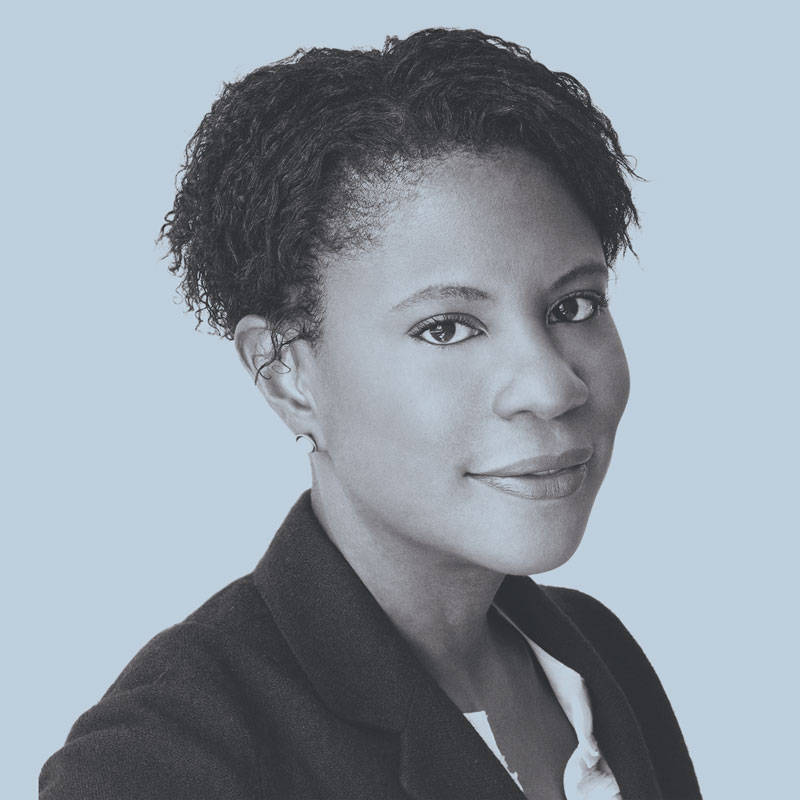Q&A with
Alondra Nelson
The dean of social science at
Columbia University discusses
her book The Social Life of DNA.
BY MISHA ANGRIST
Why did you choose to examine African-Americans’ approach to genetic ancestry in The Social Life of DNA?
Given the Tuskegee syphilis experiment, given the history of eugenics, one of the curiosities for me was why in the world would African-Americans put their saliva in an envelope and expect that they’re going to get anything meaningful for their lives or their history [from a genetic ancestry] test? That became the puzzle of the book.
What did you learn?
That there were all sorts of complicated answers. The African-American genealogists I spoke with were not only suspicious, they were also curious — they were science geeks. I thought if they knew better, then they would do better. But what they said was, “Look, we know this history [of Tuskegee and eugenics] and we’re going into this with that history in mind, and we’ll take that into account as we negotiate and think about the results we get back.”
What does it mean for DNA to have a “social life?”
Initially, I thought I was talking about racial identity and ethnic identity. And what I heard back was that the genetic ancestry experience was part of a lot of other experiences that African-Americans were having: in the criminal justice system, in clinical settings, and in genealogical settings. So, what people think about genetics is often drawing on all of these experiences simultaneously. What “the social life of DNA” means is that if we are to understand what genetics means at this moment, then we need to be thinking about all of these experiences and not stay in our silos as scholars and researchers.
Your book describes genetics in the context of a series of racial and historical “reconciliation projects.” What does that mean exactly?
When something happened 100 or 200 years ago, it can feel very abstract. Genetic genealogy is not about the abstract stranger — it’s about the person who lives next door. It’s about the person who is the great-great granddaughter or grandson of one of these enslaved people. So there’s a way in which genetic genealogy and genetic ancestry testing allows us into historical things that can seem very abstract. That’s where the idea of racial reconciliation comes from.
For a long time you resisted taking genetic ancestry tests yourself. Why?
The science could be better. The databases are private for the most part. We don’t know what algorithms people are using to tabulate the assignments [to various ethnic groups]. We don’t know the weightings of various markers to say, “you have this percentage of African ancestry” or “you have this percentage of European ancestry.” What we hold to be the gold standard of science with regard to reproducibility, verifiability, peer review — none of these things obtain for genetic ancestry testing. So that gave me pause.
Despite those misgivings, you eventually relented and took an ancestry test. In 2010, you were part of a public event in Atlanta, where you learned the results in a “big reveal,” along with Martin Luther King III, among others. What was that experience like?
It was kind of surreal. It had become clear to me that the reveal is an important part of the emotional power of the experience. The audience came for that. But my emotion was tempered because I knew too much [about the limits of the test], though I still felt like I owed the audience something. But it turned out that the audience does most of the [emotional] work.
And you’re now contemplating doing further genetic ancestry testing. Is that because the science is better?
Yes. And genealogists have gotten a lot more sophisticated. They upload to third-party apps like GEDmatch. Ancestry.com has made it more possible to link the conventional and genetic genealogy records. That’s interesting to someone like me studying reconciliation, because it requires other people to open their family trees to you. If you get pings from a fourth cousin and you align your trees, then that’s a different experience from doing it on your own.
How does the fact that people are taking this upon themselves and self-organizing make current approaches to genetic ancestry different from the way such testing used to be done?
They become autodidacts by going to conferences and reading papers. Twentieth-century eugenics research on “feebleminded” people, on people of Jewish descent, all the racist research — that was only top-down. [In those days] only people of scientific authority sponsored it, whereas here you have people opting in to the experience. As much as we want to be cautious, we have to recognize that opting in is a different experience from top-down declarations about the meaning of one’s DNA.
How do you respond to those who worry that genomics will just reinforce existing racial and racist ideas, especially given the current political climate in the U.S.?
Do we need to worry about the claims genetic scientists make that get taken up to justify forms of inequality and for social and political discrimination? Absolutely, yes! [But] the deep racial fissures in the U.S. that were brought into relief by the presidential campaign will not change African-Americans’ desire to use genetic ancestry testing to heighten understanding of historical and enduring racial inequality. To the contrary, this new political context may well increase the use of DTC genetics for this purpose, because part of what came along with the Right’s political rhetoric was a willful denial of past and present racial injustice.
>via: http://genomemag.com/alondra-nelson/#.WOzUxtIrK00?platform=hootsuite


